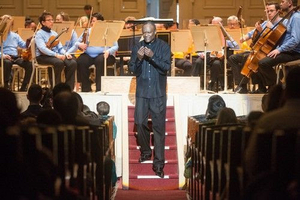Andris Nelsons Conducts Brahms and Schumann in New BSO NOW Stream Available Today
These two composers, in their very different ways, help define German Romantic music in the middle of the 19th century.

BSO Music Director Andris Nelsons leads works by two closely associated composers, Robert Schumann and Johannes Brahms, in the first of three programs in "Pathways of Romanticism," the final series of the BSO's 2020-21 streaming season.
These two composers, in their very different ways, help define German Romantic music in the middle of the 19th century. Brahms' Serenade No. 2, which opens the program, reflects the composer's deep reverence for the German and Viennese musical traditions. Contrasting strongly with his tumultuous Piano Concerto No. 1, written at about the same time in the late 1850s, the Serenade No. 2 reveals hidden depths of expression within its fundamentally bucolic warmth and high spirits. Brahms' friend and mentor Robert Schumann composed his Symphony No. 4 originally in 1841. It was the second symphony he'd embarked on, having written the Symphony No. 1 earlier the same year. However, dissatisfied with the result of the new symphony, he shelved it for ten years before revising the orchestration and structure, at which time he published it as his Opus 120. Influenced by the Fifth Symphony and other Beethoven works, Schumann uses recurring thematic ideas to tie together the four movements of this majestic score.
Our chamber music work is Cambridge-based composer Marti Epstein's nuanced trio Komorebi, a musical meditation on the Japanese term for light shining through tree leaves-and a contemporary composer's take on the Romantic age's love of imagery. The BSO musicians performing the work are John Ferrillo, oboe; William R. Hudgins, clarinet; and Elita Kang, violin. (Latvian violinist Baiba Skride, a frequent collaborator with Andris Nelsons and the BSO, was originally scheduled to perform Schumann's Violin Concerto in D minor on this program. Unfortunately, she was not able to travel to the U.S. at the time of recording.)
In the second episode of our final series, BSO members are centerstage in two Romantic concertos. BSO Principal Clarinet William R. Hudgins is soloist in Carl Maria von Weber's brief Concertino for Clarinet and Orchestra, which the BSO hasn't performed since 1884. (The Pops played it most recently in 1983.) This virtuosic theme-and-variations piece straddles the Classical and Romantic eras: written in 1811, it's an early work in the catalog of the composer who virtually invented German Romantic opera. Four BSO horns perform Robert Schumann's unusual Conzertstück, which was premiered in Leipzig in 1850 and which Schumann called "one of my best pieces." The soloists here are treated as a collective rather than four completely independent voices. The BSO's string sections are highlighted in the opening work, Felix Mendelssohn's String Symphony No. 10. Mendelssohn-whose childhood precocity rivaled Mozart's-wrote this assured, stormy piece over five days in May 1823 at age fourteen. Closing this episode is William Grant Still's Suite for violin and piano (1943), the three movements of which were each inspired by works by three great African American sculptors of the mid-20th century.
In the final program of our 2020-21 season, Andris Nelsons returns to a focus of his recent conducting activity: music of Richard Strauss. Strauss was only 18 when his Serenade for Winds, Op. 7, was premiered in Dresden. Its classical clarity is in stark contrast to the lush, almost cinematic orchestral Interludes from the composer's 1923 opera Intermezzo, composed 40 years later. Based on an episode in Strauss' life, the plot of the libretto (written by the composer himself) revolves around a misunderstanding that drives the wife of a conductor to jealous extremes. Strauss called his opera a "bourgeois comedy with symphonic interludes," indicating the importance of the purely orchestral music of the four interludes, which respectively tell of the bustle and joy of travel, an introspective scene by the fireside, a card-playing scene, and a brief happy ending touching on many of the opera's main themes. The American composer Jennifer Higdon's colorful, energetic 1995 wind quintet Autumn Music, which was in part inspired by Samuel Barber's Summer Music, is this program's chamber music work.
As with the season's other BSO NOW offerings, this month's three online video streams are accompanied by magazine segments. These features put Romanticism in historical and cultural context. This week's magazine feature, "Hallmarks of Romanticism," explores how influences from painting and literature were strong factors in the work of such early Romantic composers as Weber, Mendelssohn, and Schumann.
The BSO NOW concert streaming platform launched in November and was created in response to the live performance hiatus in place since March 2020, due to the restrictions around the COVID-19 pandemic. Most BSO NOW concert streams are available for on-demand viewing for 30 days past their original launch dates through bso.org/now. Formal BSO titles for conductors referenced in this release: Andris Nelsons is the Ray and Maria Stata BSO Music Director and Thomas Wilkins is the BSO's Artistic Advisor, Education and Community Engagement, and Germeshausen Youth and Family Concerts Conductor.
CRB Classical 99.5 FM and www.classicalwcrb.org continue to feature encore Boston Symphony Orchestra concerts on Saturday evenings at 8 p.m. The program for Saturday, April 17, led by Andris Nelsons, features Brahms' Piano Concerto No. 2, with pianist Hélène Grimaud as soloist, and the composer's Symphony No. 4, as well as the world premiere of Timo Andres' BSO-commissioned Everything Happens So Much. This performance originally took place in November 2016.
Photo credit: Hilary Scott
Play Broadway Games
Videos






%20(1024%20×%20512%20px).png)